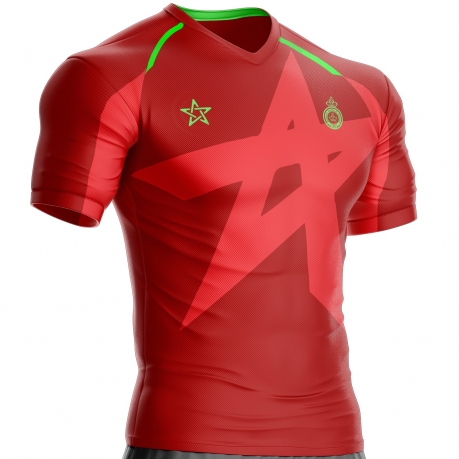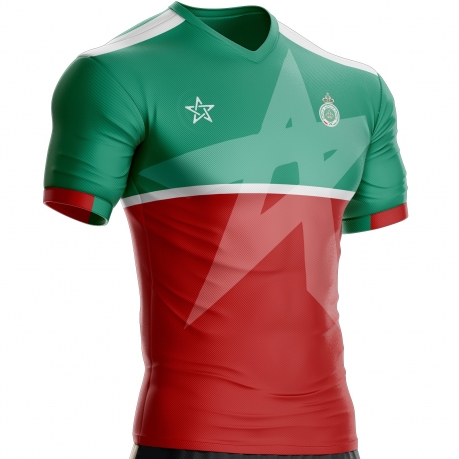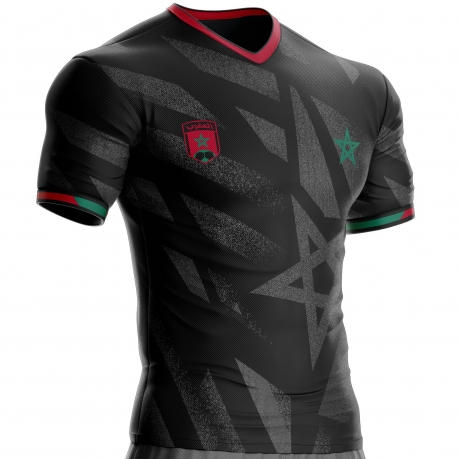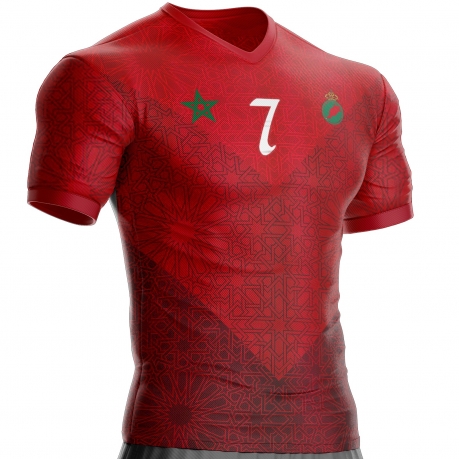Tunisia VS Morocco match: the historic clash!

On June 12, 1975, the El Menzah Olympic stadium in Tunis was in turmoil. Tunisia and Morocco faced each other in a crucial match for qualifying for the 1978 World Cup. The stakes were immense, and the tension was palpable in the stands. The hard-fought match ended in a draw (1-1), leaving the two teams tied on points.
This match was just one chapter in the long and vibrant history of football rivalry between Tunisia and Morocco. Two neighboring nations, sharing a common passion for football, and whose destinies have crossed many times on the field.
In this article, we will explore the origins and different dimensions of this legendary rivalry. We will analyze the factors that fuel it, its impact on a sporting and societal level, and the prospects for positive developments for the future.
So, buckle up and get ready to dive into the heart of this exciting football rivalry!
Origins of the rivalry
The football rivalry between Tunisia and Morocco has its roots in several factors, including:
• Geographic proximity: Located in North Africa, the two countries share a common border and a long history of cultural and economic interactions. This proximity creates a feeling of familiarity and natural rivalry, which translates into the sporting field.
• Nationalism and pride: Football occupies an important place in the national identity of both countries. Each victory against a historic rival like Morocco is a source of immense pride for supporters and a symbol of the strength and vitality of the nation.
• Political context: Relations between Tunisia and Morocco have experienced moments of tension and political rivalry, particularly in the 1960s and 1970s. These tensions have sometimes had repercussions on the field, exacerbating sporting rivalry.
Key moments
Several notable encounters have marked the history of this rivalry. Here are some examples:
• 1965: During the African Games in Brazzaville, Tunisia beats Morocco 2-0 in the semi-final. This match remains engraved in the memory of Tunisian supporters as a first symbolic victory against a major rival.
• 1975: The 1978 World Cup qualifying match, mentioned in the introduction, is another pivotal moment in the rivalry. The 1-1 draw in Tunis left both teams in the race for qualification, and the second leg in Morocco was marked by extreme tension.
• 2004: The final of the 2004 African Cup of Nations pitted the two teams against each other. Morocco won the match 2-1 after extra time, in an electric atmosphere and a context of heightened rivalry.
Evolution of the rivalry
Over time, the rivalry between Tunisia and Morocco has evolved. If the passion and the stakes remain intact, the political dimension has faded with the calming of relations between the two countries.
More and more, the rivalry is experienced on a purely sporting level, with a growing mutual respect between players and supporters. The spirit of fair play and fair play are gaining ground, and the two teams mutually recognize their sporting value.
The rivalry between Tunisia and Morocco is an important component of the history of football in North Africa. It is a source of passion and emotion for supporters of both countries, and it continues to fuel intense and spectacular encounters.
However, the rivalry is evolving towards a healthier and more constructive dimension, based on mutual respect and love of football. It is in this spirit that the rivalry between Tunisia and Morocco can continue to enrich the African football landscape and inspire future generations.
Factors Fueling Rivalry
Nationalism and pride
Football occupies a central place in the national identity of Tunisia and Morocco. For supporters, each victory against a historic rival like Morocco is a source of immense pride and a symbol of the strength and vitality of the nation. Football thus becomes a field of expression of nationalism and a means of celebrating national identity.
Geographic proximity
The geographic proximity of the two countries creates increased proximity and competition. Fans of both teams meet more often, fueling rivalry and heated exchanges. In addition, the media and social networks broadcast the images and emotions of matches to a wide audience, contributing to the amplification of the rivalry.
Fan battles
Supporters of both teams are known for their passion and dedication. During matches, the stands transform into a veritable cauldron of emotions, with songs, slogans and fans competing in inventiveness and fervor. This rivalry between fans can sometimes degenerate into regrettable incidents, but it is also an important element of the unique atmosphere of matches between Tunisia and Morocco.
Media and social networks
Media and social networks play an important role in amplifying rivalry. Intensive media coverage of the matches and passionate comments from Internet users help to create a buzz around the matches and pique the interest of supporters. Additionally, social media allows fans of both teams to connect and share their emotions in real time, which reinforces the feeling of rivalry.
The rivalry between Tunisia and Morocco is fueled by a multitude of factors, including nationalism, geographic proximity, fan passion and the role of media and social networks. This rivalry is an important component of the history of football in North Africa and it continues to fuel intense and spectacular encounters.
Impact of the rivalry
Sporting dimension
The rivalry between Tunisia and Morocco affects the sporting dimension in several ways. Preparing for matches is often marked by particular tension, with increased stakes and increased attention to detail. The course of matches is also often more intense and contested, with greater physical commitment and a fierce desire to win.
Bilateral relations
The impact of the rivalry on bilateral relations between Tunisia and Morocco is complex. In times of political tension, sporting rivalry can exacerbate tensions and create a climate of distrust. However, in a context of peaceful relations, rivalry can be a factor of rapprochement and positive emulation between the two countries.
Social cohesion
The football rivalry between Tunisia and Morocco can play a positive role in the social cohesion of the two countries. Indeed, it allows supporters to come together around a common cause and celebrate their passion for football. Rivalry can also strengthen the sense of national belonging and pride in one's country.
The rivalry between Tunisia and Morocco has a significant impact on sporting, social and political levels. It is an important component of the identity of the two countries and it continues to fuel intense and spectacular encounters. However, the rivalry is evolving towards a healthier and more constructive dimension, based on mutual respect and love of football. It is in this spirit that the rivalry between Tunisia and Morocco can continue to enrich the African football landscape and inspire future generations.
Future prospects
The rivalry between Tunisia and Morocco is a reality that will persist over time. However, it is important to channel this rivalry towards a positive and constructive dimension.
Here are some future prospects for the rivalry between Tunisia and Morocco:
Promote fair play and mutual respect : It is important to raise awareness among players, fans and the media of the importance of fair play and mutual respect. Football is above all a sport, and rivalry should never taint the spirit of sportsmanship.
Encourage exchanges and cooperation : Rivalry should not be an obstacle to cooperation between the two countries. Sports cooperation and cultural exchange initiatives can help overcome rivalry and strengthen ties between Tunisia and Morocco.
Leveraging rivalry for football development : The rivalry between Tunisia and Morocco can be a driver of development for football in both countries. Indeed, it can encourage sports authorities to invest more in football and improve the quality of player training.
In conclusion, the rivalry between Tunisia and Morocco is a force that can be used for the good of football and for the development of both countries. It is important to channel this rivalry towards a positive and constructive dimension, and to ensure that it is a factor of rapprochement and positive emulation between the two nations.
Overcoming rivalry
Fair play and sportsmanship
It is essential to promote fair play and mutual respect between players and supporters of both teams. Football is above all a sport, and rivalry should never taint the spirit of sportsmanship.
Here are some initiatives to encourage fair play and mutual respect:
Awareness campaigns: Launch awareness campaigns among players, supporters and the media to promote the importance of fair play and mutual respect.
Charter of good conduct: Develop a charter of good conduct to be signed by the players and supporters of both teams.
Fair Play Awards: Award rewards to players and teams who demonstrate exemplary fair play.
Cooperation and exchanges
Rivalry should not be an obstacle to cooperation between Tunisia and Morocco. Sports cooperation and cultural exchange initiatives can help overcome rivalry and strengthen ties between the two countries.
Here are some examples of cooperation and exchange initiatives:
Organization of friendly matches: Organize friendly matches between the national teams of the two countries outside official competitions.
Player and coach exchange programs: Establish player and coach exchange programs between clubs from the two countries.
Collaboration in the field of youth training: Collaborate in the field of training young footballers and share best practices.
Future of Relationships
In conclusion, it is possible to envisage a future where the sporting rivalry between Tunisia and Morocco is healthy and constructive for relations between the two countries.
By promoting fair play and mutual respect, encouraging cooperation and exchanges, and channeling rivalry towards a positive dimension, rivalry can become a factor of rapprochement and positive emulation between the two nations.
The rivalry between Tunisia and Morocco is a force that can be used for the good of football and for the development of both countries. It is important to channel this rivalry towards a positive and constructive dimension, and to ensure that it is a factor of rapprochement and positive emulation between the two nations.
Summary of key points
The football rivalry between Tunisia and Morocco is a rich and complex history, fueled by several factors:
Nationalism and Pride: Football is a symbol of national identity for both countries, and every victory against a historic rival is a source of immense pride.
Geographic proximity: The proximity of the two countries creates increased proximity and competition.
Fan Battles: The fans of both teams are passionate and dedicated, and their rivalry can be intense at times.
Media and social networks: The media and social networks amplify the rivalry and help create buzz around matches.
Impact of the rivalry
The rivalry has a significant impact on a sporting, social and political level:
Sporting dimension: The matches between the two teams are often intense and contested.
Bilateral relations: Rivalry can exacerbate political tensions or be a factor of rapprochement.
Social cohesion: Rivalry can bring supporters together and reinforce a sense of national belonging.
Overcoming rivalry
It is possible to channel rivalry towards a positive and constructive dimension:
Promote fair play and mutual respect.
Encourage cooperation and exchanges.
Leverage rivalry for football development.
Looking to the future
In conclusion, the rivalry between Tunisia and Morocco is a force that can be used for the good of football and for the development of both countries.
It is important to channel this rivalry towards a positive and constructive dimension, and to ensure that it is a factor of rapprochement and positive emulation between the two nations.
Let us hope that the rivalry between Tunisia and Morocco will continue to be part of a spirit of fair play and mutual respect, and that it will help to enrich the African football landscape and inspire future generations.










